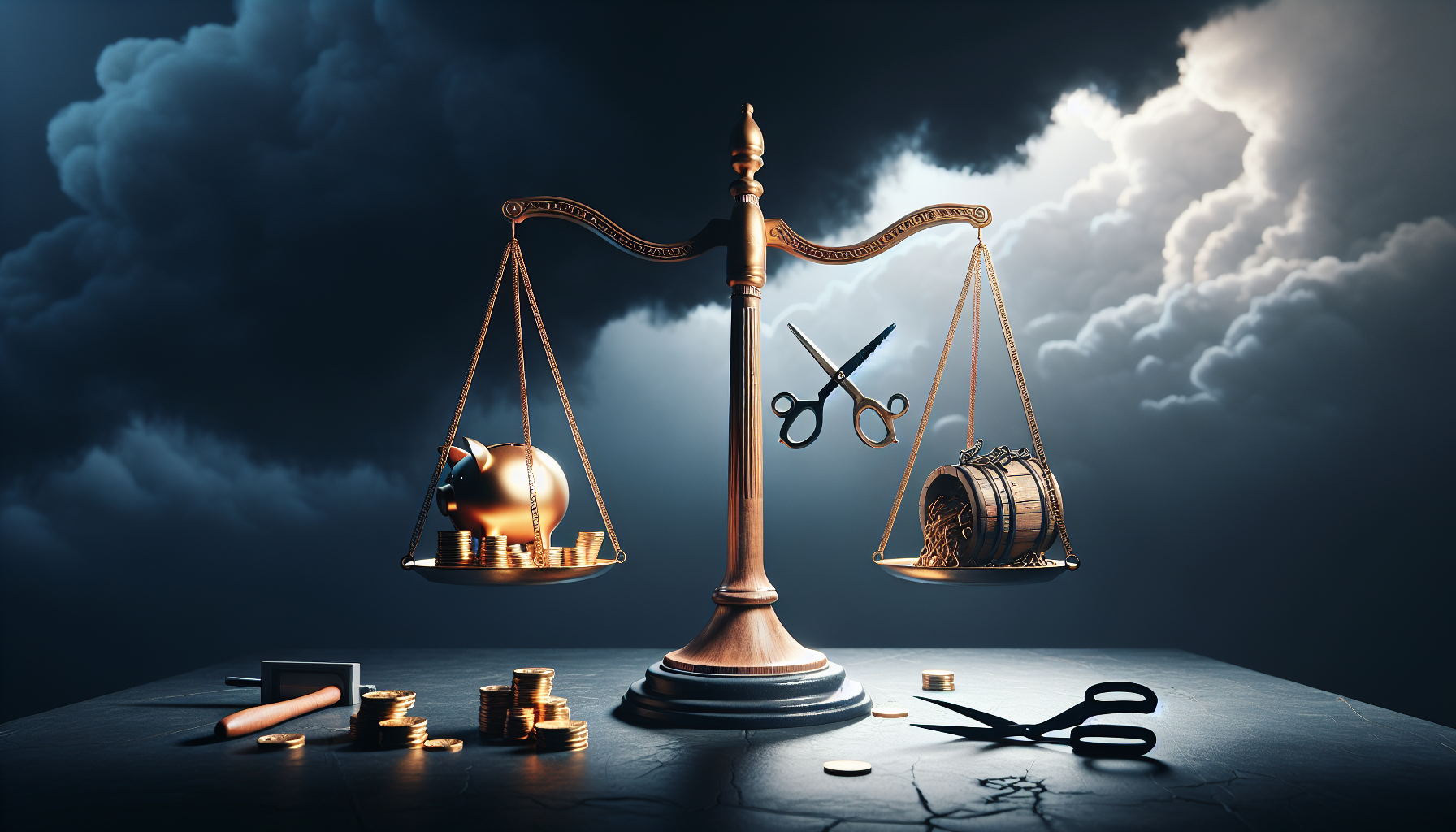
Confronting financial distress can be intimidating, necessitating a judicious selection between declaring insolvency and opting for debt elimination. Each choice demands a discerning understanding for an informed decision.
Bankruptcy signifies applying legal procedures, facilitating in either debt eradication or its repayment.
This involves several categories like Chapter 7, Chapter 11, and Chapter
Though bankruptcy guarantees insolvency, which can provide significant debt relief, it entails considerable drawbacks, such as seriously affecting your credit score.
Alternatively, debt elimination encompasses strategies to systematically settle or lessen debt.
Liquidation could be an attainable objective through tactics like debt consolidation. This method allows the combination of multiple debts into a singular, manageable payment. Debt settlement through this process involves crafting a comprehensive approach that could lead to insolvency, liquidation but ultimately results in debt relief and consolidation.
Understanding Bankruptcy Personal Insolvency and Debt Elimination
Navigating the murky waters of financial distress can be intimidating for many individuals, often leading to personal bankruptcy – a condition that’s challenging yet not insurmountable. This hardship frequently signals an imminent insolvency crisis, but various relief solutions exist, including that of Chapter bankruptcy.
Chapter bankruptcy, notably Chapter 7, is often recognized as the most prevalent choice among financial solutions.
This legal process facilitates debt restructuring or total debt elimination, making it imminently beneficial for those struggling.
Misconceptions about bankruptcy, however, continue to prevail, often distorted by societal stigma and misinformation.
Understanding these aspects of bankruptcy requires thorough analysis of both its advantages and potential consequences, such as potential impacts on credit scores.
This is where expert advice can prove invaluable in making informed decisions about opting for Chapter bankruptcy or exploring other alternatives.
Bankruptcy is not the only route for financial relief. Alternative methods such as personal bankruptcy, chapter bankruptcy, debt repayment, and debt restructuring can be utilized to manage and overcome financial crises.

The Role of Debt Settlement in Avoiding Bankruptcy
Debt settlement effectively addresses financial distress, serving as a viable alternative for individuals keen on avoiding the complex implications of a bankruptcy filing. It provides a potential path to financial solvency by permitting debtors to negotiate with creditors for a reduced settlement amount.
The distinction between debt discharge and bankruptcy is crucial to understanding debt management.
While both offer relief from overwhelming financial stress, their processes differ significantly.
Bankruptcy involves a legal proceeding, and a successful bankruptcy filing may lead to debt discharge. Conversely, debt settlement, a proactive approach often involving credit counseling, focuses on reducing the total debt amount.
Credit counseling plays an essential role in debt settlement, providing strategies for individuals to manage their debt and regain financial stability. This aspect of debt management serves as a lifeline for those overwhelmed by accumulating debts.
Nevertheless, like any form of financial distress relief, it comes with its advantages and disadvantages
Key Points About Debt Settlement and Management
- Debt settlement serves as an alternative to bankruptcy, allowing debtors to negotiate with creditors for a reduced settlement amount.
- Bankruptcy and debt discharge, although both providing relief from financial stress, operate through different processes. Bankruptcy involves legal proceedings and may lead to debt discharge if successful.
- Debt settlement is a proactive approach often involving credit counseling, focusing on reducing the total debt amount.
- Credit counseling plays a vital role in debt settlement, providing strategies for individuals to manage their debt and regain financial stability.
Exploring Debt Consolidation as an Alternative to Bankruptcy
Navigating financial difficulties often requires a comprehensive understanding of bankruptcy, credit repair, and debt consolidation. While bankruptcy is a legal process defined under insolvency law, it has potential drawbacks such as long-lasting damage to your credit report.
These adverse effects can be learned in a debtor education course.
Debt consolidation, on the other hand, is an alternative strategy worth considering.
It merges multiple debts into one single manageable payment scheme. This approach intends to decrease high-interest debt, considerably simplifying the repayment process.
Crucially, debt consolidation isn’t a form of debt forgiveness but a method of restructuring your debt into a manageable format.
Individual financial circumstances vary widely, implying there’s no universal solution for debt issues.
Bankruptcy might be favourable for those overwhelmed by unmanageable debt. In contrast, individuals capable of maintaining regular debt negotiation payments over a sustained period might find debt consolidation more beneficial, as they can better utilize credit repair strategies, complete a debtor education course, explore debt forgiveness options, and understand insolvency laws.
How Credit Counseling Facilitates Debt Elimination
Credit counseling is crucial in paving the way towards debt-free living, as it equips individuals with the necessary knowledge on secured and unsecured debt. This understanding facilitates debt elimination by empowering debtors to manage their financial responsibilities effectively.
A significant aspect of this process, creditor negotiation, allows for a strategic approach to mitigate the impact of existing financial obligations.
This might involve the reduction of interest rates, thus making the journey towards a debt-free existence more feasible.
Unlike the harsh implications of resorting to a bankruptcy court, credit counseling provides a softer, more manageable approach. Not only does declaring bankruptcy leave a long-lasting mark on one’s credit report, but it also brings about potentially severe consequences, such as nondischargeable debt.
Credit counseling discourages such a drastic measure and instead encourages informed decision-making for effective debt management. This counseling method can efficiently facilitate creditor negotiation, help in adapting to debtfree living, guide through the bankruptcy court proceedings, manage nondischargeable debt, and handle both secured and unsecured debt.
Credit Counseling
- Credit counseling equips individuals with necessary knowledge on handling both secured and unsecured debts, aiding in effective debt management.
- Through credit counseling, individuals can learn to strategically negotiate with creditors to reduce interest rates, making a debt-free life more attainable.
- Unlike declaring bankruptcy, which leaves a lasting mark on one’s credit report and can lead to nondischargeable debt, credit counseling encourages a softer, more manageable approach to debt elimination.
- Credit counseling can guide individuals through the bankruptcy court proceedings, manage nondischargeable debt, and help in the transition to a debt-free lifestyle.
What Does Debt Restructuring Mean for Financial Distress
Experiencing significant hurdles like financial distress can present an overwhelming challenge for many businesses. The inability to meet financial obligations calls for effective solutions such as Debt Restructuring, often serving as a lifeline in dire situations.
The process of Debt Restructuring includes renegotiating terms of outstanding debt.
It presents a financially viable alternative to declaring insolvency or experiencing a Bad Debt Writeoff.
This strategy provides a pathway towards stability, empowering businesses to bypass the detrimental impacts of financial crisis.
Consider the case of Company X, a firm facing acute financial disaster.
Through a well-planned Debt Restructuring program, the company embarked on the journey of Debt Recovery. This allowed them to sidestep the looming threat of insolvency, showcasing the effectiveness of such a strategy. While Debt Restruct offers services like debt recovery, financial counseling, bad debt write-off, debt adjustment, and money management.
Navigating Bankruptcy Filing A Guide to Debt Forgiveness
Financial hardship can be a challenging situation to navigate. Yet, there exist several bankruptcy alternatives for those grappling with towering debts.
These pathways to relief comprise debt counselling services, among others, and consumer proposal options that facilitate custom repayment plans with creditors.
As a result, these services enable a potential reduction in the outstanding amount, assisting you in regaining financial control.
Another efficient avenue is the wage earner’s plan, often known as Chapter 13 bankruptcy. This strategic solution allows individuals encountering financial hardship, and with a consistent income, to settle their debts over a three-to-five-year timeline.
A thorough understanding of these bankruptcy alternatives can significantly help mitigate the stress associated with financial struggles and suggest a feasible route towards debt forgiveness.
Remember, these different debt counselling services and strategies have definitive implications on your overall financial health. Therefore, making an informed decision, especially when dealing with financial hardship, requires considering bankruptcy alternatives like debt counselling services, consumer proposals, and wage earners plan.
Bankruptcy Alternatives
- Debt counselling services and consumer proposals can help facilitate custom repayment plans with creditors, potentially reducing the outstanding amount.
- The wage earner’s plan, also known as Chapter 13 bankruptcy, allows individuals with a consistent income to settle their debts over a three-to-five-year timeline.
- Understanding these bankruptcy alternatives can significantly help alleviate the stress associated with financial struggles and provide a feasible route towards debt forgiveness.
- These different debt counselling services and strategies can have definitive implications on your overall financial health, making it essential to make informed decisions.
The Impact of Bankruptcy on Credit Repair
Bankruptcy and credit repair, interconnected financial pillars, are crucial for anyone enduring fiscal hardships. Through bankruptcy law, bankruptcy is a legal proceeding for individuals or businesses unable to address their financial obligations.
Contrastingly, credit repair involves rebuilding one’s credit score, often negatively affected by bankruptcy or accumulated debts.
Securing bankruptcy advice and fully understanding its implications is a step many consider.
Declaring bankruptcy doesn’t hold monopoly as a debt solution. Viable financial alternatives like individual voluntary arrangements or credit card debt settlement might successfully alleviate one’s monetary struggles.
These routes, too, influence credit health in ways that call for careful analysis before taking a decision.
It’s paramount to scrutinize bankruptcy for credit repair from all angles.
While bankruptcy can provide relief from many financial binds as per bankruptcy law, the negative fallout like a significant decrease in credit scores can’t be overlooked. Weighing the options between individual voluntary arrangement, bankruptcy advice, debt solution, credit card debt settlement, and bankruptcy law can significantly influence your financial decisions.
Debt Resolution vs Filing for Bankruptcy Whats the Best Choice
Navigating the terrain of financial crisis management requires an understanding of two essential financial mechanisms – debt resolution and bankruptcy proceedings. Debt resolution, a strategic method for handling liabilities, involves negotiations with creditors to lessen the amount owed.
It’s a tool used for various financial burdens like credit cards, medical bills, and private student loans.
Contrarily, bankruptcy proceedings unfold as a legal remedy, providing relief to individuals or businesses who find themselves unable to pay off their debts.
Various types of bankruptcy filings exist, such as Chapter 7 and Chapter 13, each possessing unique processes and implications, often kicked off by a bankruptcy petition.
The best choice between employing debt resolution or avoiding insolvency through bankruptcy hinges significantly on one’s specific financial situation.
Both options carry weighty impacts on your credit score and overall financial health. For instance, although debt resolution might negatively affect your credit score, the impact could be less severe than bankruptcy proceedings, potentially helping in avoiding insolvency and bettering financial crisis management than a bankruptcy petition.
Key Points on Financial Crisis Management
- Debt resolution is a strategic method for handling liabilities and involves negotiations with creditors to reduce the amount owed.
- Bankruptcy proceedings are a legal remedy for individuals or businesses unable to pay off their debts, with various types such as Chapter 7 and Chapter
- The choice between debt resolution and bankruptcy significantly depends on one’s specific financial situation.
- Both debt resolution and bankruptcy have substantial impacts on credit score and overall financial health, but the former might have a less severe effect.

Get a Free Bankruptcy Case Evaluation